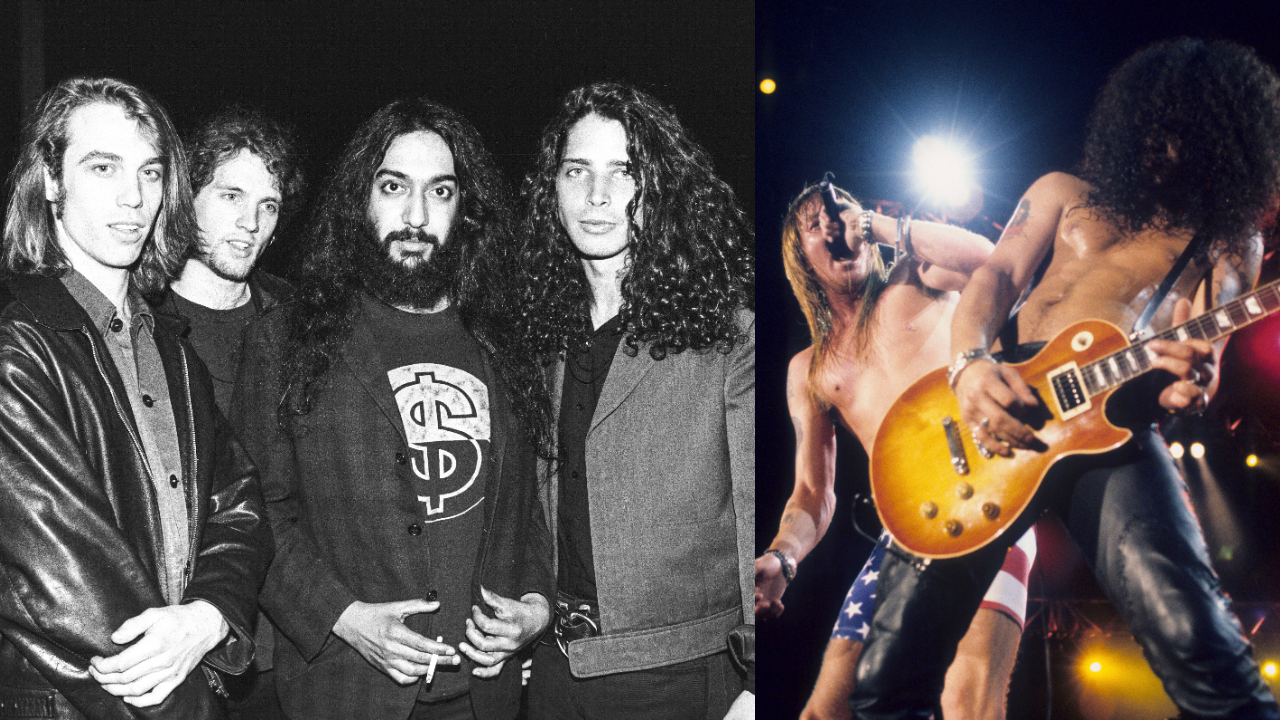“I had a massive animosity towards those fans”: Soundgarden’s manager thought it would be a great idea for them to support Guns N’ Roses, the band disagreed

In 1991, Guns N’ Roses were the biggest rock band on the planet but a fresh wave of groups had come along making music with a grittier, harder edge were paving the way for a new sort of sound, one that would come to be known as grunge. Instead of trying to distance themselves from these young upstarts, though, GN’R opened their door. They had just released their expansive double Use Your Illusion set and were about to embark on a similarly sprawling world tour to accompany it and they invited Soundgarden to open for them.
At the time, Chris Cornell & co. were coming off the back of their own major breakthrough in third album Badmotorfinger. The GN’R tour was the sort of high-profile jaunt that could take them to another level, putting them in front of a legion of potential new fans, bringing their songs to the ears of thousands who might not have heard them before. It was a win-win, unless, of course, you were actually in the band. For Cornell, Ben Shepherd, Matt Cameron and Kim Thayil, it turned into an important lesson in how not to act once you hit huge success.
They were dubious about the support slot from the off. “After I got the call about the Guns N’ Roses tour, I went to where they were,” Soundgarden’s former manager Susan Silver explained in Mark Yarm’s essential grunge opus Everybody Loves Our Town. “I remember walking in, I had a box of T-shirts, I was so excited: ‘Hey guys! I have something to tell you! We got an offer today… to go… on tour… WITH GUNS N’ ROSES!” They didn’t say a word. After about 30 seconds – it felt like an eternity – one of them said, ‘What’s in the box?”
For Soundgarden’s outspoken bassist Ben Shepherd, the GN’R world was a complete anathema, the opposite of what he wanted his band to be. “I’m a punk rocker, man,” he explains in the book. I like Black Flag and way more hardcore stuff. That kind of butt rock, I don’t like. I want nothing to do with that kind of world. I’m not a rock star, I don’t like rock stars, and I don’t want to be around them… the tour was a full-on metal extravaganza. It was insane. I never wanted to play stadiums… there we are, getting exposed to all these butt rockers, the same kind of people who would try to beat me up when I was a punk rocker. I had a massive animosity towards those fans.”
Drummer Cameron added that the run of dates, in particular the goings-on behind the scenes, was instructive for Soundgarden in how bands ought to behave. “It was an eye-opening lesson as far as how not to tour if you become successful,” he said. “Each guy had a bodyguard and they were completely wasted the whole time. Axl would make the band wait an hour or two before they went on.”
Cameron said he remembered one show where GN’R frontman Rose was threatening to go out and break the band up live onstage. “There were a couple of occasions like that where we had to clear the fuck out because people were predicting a riot was going to happen.”
Talking about his memories of the tour in an interview with Vulture a few years ago, the late Cornell said his main memory was feeling downhearted at seeing such a huge band mired in dysfunction and chaos. “Without saying anything negative about Axl, what I remember the most was Duff and Slash and everyone else being regular, sweet, warm guys in a rock band that just wanted to play rock music,” he recalled. “And then, like, there was this Wizard of Oz character behind the curtain that seemed to complicate what was the most ideal situation they could ever have been in: They were the most successful and famous rock band on the planet. Every single show, hundreds of thousands of fans just wanted to hear songs. For some reason there seemed to be this obstacle in just going out and participating in that. That is what I remember the most. It’s sad.”
Soundgarden obviously struggled to keep their distaste for all the GN’R circus to themselves – by the time the tour came to a close, GN’R’s crew had begun to refer to the Seattle rockers as “Frowngarden”. “Why’d we get called Frowngarden? Because we weren’t party monsters,” decided Shepherd. “We weren’t motherfucking rock stars. We were not like that. We were there to play music. We weren’t there for the models and the cocaine. We were there to blow your doors off.”
The two bands’ respect for each other somehow remained, though. Cornell went on to cover the plaintive GN’R ballad Patience, whilst in the wake of Cornell’s death in 2017, Axl & co. performed a rendition of Soundgarden’s classic Black Hole Sun as part of their live set.
